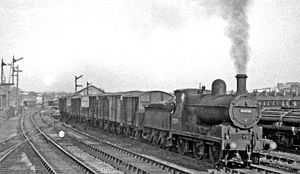L&YR Class 28
| L&YR Class 28 | |
|---|---|
 No. 52592 shunting at Thornhill | |
| Specifications | |
| Power type | Steam |
| Build date | 1909 |
| Configuration | 0-6-0 |
| Gauge | 4 ft 8 1⁄2 in (1,435 mm) |
| Wheel diameter | 5 ft 1 in (1.549 m) |
| Fuel type | Coal |
| Boiler pressure | 180 psi (1.24 MPa) |
| Cylinders | Two, inside |
| Cylinder size | 20.5 in × 26 in (521 mm × 660 mm) |
| Valve gear | Joy valve gear[1] |
| Tractive effort | 27,405 lbf (121.9 kN) |
| Career | |
| Railroad(s) | Lancashire and Yorkshire Railway |
| Class | Class 28 |
| Power class | LMS & BR: 3F |
The Lancashire and Yorkshire Railway Class 28 was a class of 0-6-0 steam locomotive, designed by George Hughes for the Lancashire and Yorkshire Railway (L&YR). It was a rebuild of Aspinall's Class 27, with the addition of a Belpaire firebox and the extension of the footplate and front sandboxes. It was similar, but had larger cylinders and a superheater. It had 5 ft 1 inch wheels.
Ownership changes
The locomotives passed briefly to the London and North Western Railway (LNWR) in 1922 and then to the London, Midland and Scottish Railway (LMS) in 1923. The LMS gave them the power classification 3F. In 1948, the surviving locomotives (35) passed to British Railways (BR), which numbered them 52528-52619 (with gaps).[2]
In fiction
The Class 28 was the inspiration for the character James the Red Engine from The Railway Series books by the Rev W Awdry, and the spin-off TV series Thomas and Friends.[3] Awdry describes James as an experimental rebuild as a 2-6-0 with 5' 6" driving wheels. The other obvious visual difference from the Class 28 is the lack of the sandboxes over the front splashers.[4]
References
- ↑ "Rail UK Steam Loco Class Information". Railuk.info. Retrieved 2012-03-26.
- ↑ Ian Allan ABC of British Railways Locomotives, 1948 edition, part 3, page 43
- ↑ The Rev. W. Awdry; G Awdry (1987). The Island of Sodor: Its People, History and Railways. Kaye & Ward. pp. 129–130. ISBN 0-434-92762-7.
- ↑ "James". (The real prototype locomotives that inspired the Rev W Awdry). The Real Lives of Thomas the Tank Engine. Retrieved 27 January 2011.
External links
| |||||||||||||||||||||||